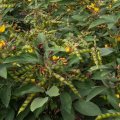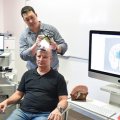A University of Queensland centre, Rangelands Australia, has become the first University-based initiative to be recognised by an Australian Rural Education Award.
The Centre within the School of Integrative Systems (SIS) at The University of Queensland was recognised by the Society for Provision of Education in Rural Australia (SPERA).
The award is for excellence in rural education, implementing initiatives that expand opportunities, bring about efficient and effective education, and provide educational benefits in rural Australia, and came as the third cohort graduated in Rangeland Management last year.
In accepting the award, Director of Rangelands Australia Dr John Taylor acknowledged the hundreds of people who had contributed to the program and course development processes, the investors such as Meat and Livestock Australia, the Australian Government’s Department of Agriculture, Fisheries and Forestry, Queensland Government and CSIRO, and other key players such as Rangelands Australia staff and the network of Rangeland Champions.
“Together, they have realised a vision of more accessible and more relevant higher education for land managers, Landcare and Natural Resource Management facilitators, government advisors, local government officers and educators in remote and regional Australia,” Dr Taylor said.
“This has been an extraordinary partnership, and a great testament to the benefits of strategic, participatory, student-centered and demand-driven approaches to the provision of higher education in an educationally disadvantaged region.
“This professional development initiative has remained grounded in the real world through the engagement of experienced land managers, yet current and forward looking by the engagement of scientists from CSIRO, State agencies and universities.”
The award citation noted that the development of UQ’s Rangeland Management postgraduate coursework program had been one of the most highly strategic knowledge and skill development initiatives in Australia, with needs and gap analyses, market research, stakeholders engaged and actively guiding program and course development, and innovations in support for mature-aged students. The approach, developed by Rangelands Australia, is now being adapted to drive a major reconstruction of the range science programs offered by 30 universities in the USA.
In Australia, the strategies have underpinned the relevance and wide appeal of the courses, the strong growth in enrolments from New South Wales, Northern Territory, Queensland, South Australia and Western Australia, and the growing national recognition of the uniqueness and value of the Rangeland Management program and its courses.
Recent graduate Penny Wallace, from Clarke Creek in Central Queensland, said: “The courses have given me a greater understanding of the diversity of rangeland businesses within Australia. The subjects are well-structured and readily relate to my own business and lifestyle, improving our management decisions and outcomes in our grazing enterprise. The interaction with lecturers has been encouraging, providing more opportunities to develop knowledge and skills that are generally not available in the bush.”
Another recent graduate, Peter Klem, from Longreach, echoed Ms Wallace’s support for the program: “The courses have allowed me to complete further studies while fulfilling my home and work commitments. I never imagined that I would have the opportunity to participate, at my age and where live, in further study. The courses are designed by and for people in the rangelands, and the study has allowed me to take a more proactive approach in my work and community.”
Rashida Khan, a graduate from Adelaide River in the Northern Territory, said: “The courses are excellent and very relevant to real life situations. Studying with UQ/Rangelands Australia was a great experience as the staff and lecturers understand the students, particularly busy, external students with multiple commitments, and are flexible in their approach. Overall, the experience was well worth it! The contacts and friendships I have made will continue into the future both professionally and personally.”
Further details of the Rangelands Australia initiative are available at the Rangelands Australia’s website.
Media: Erin Pearl at The University of Queensland (07 54601229 or 0409 265 587), John Taylor from Rangelands Australia (0429 725 838), Penny Clark (07 4938 9118), Peter Klem (07 4658 3309) or Rashida Khan (0427 415 998).
.jpg)










